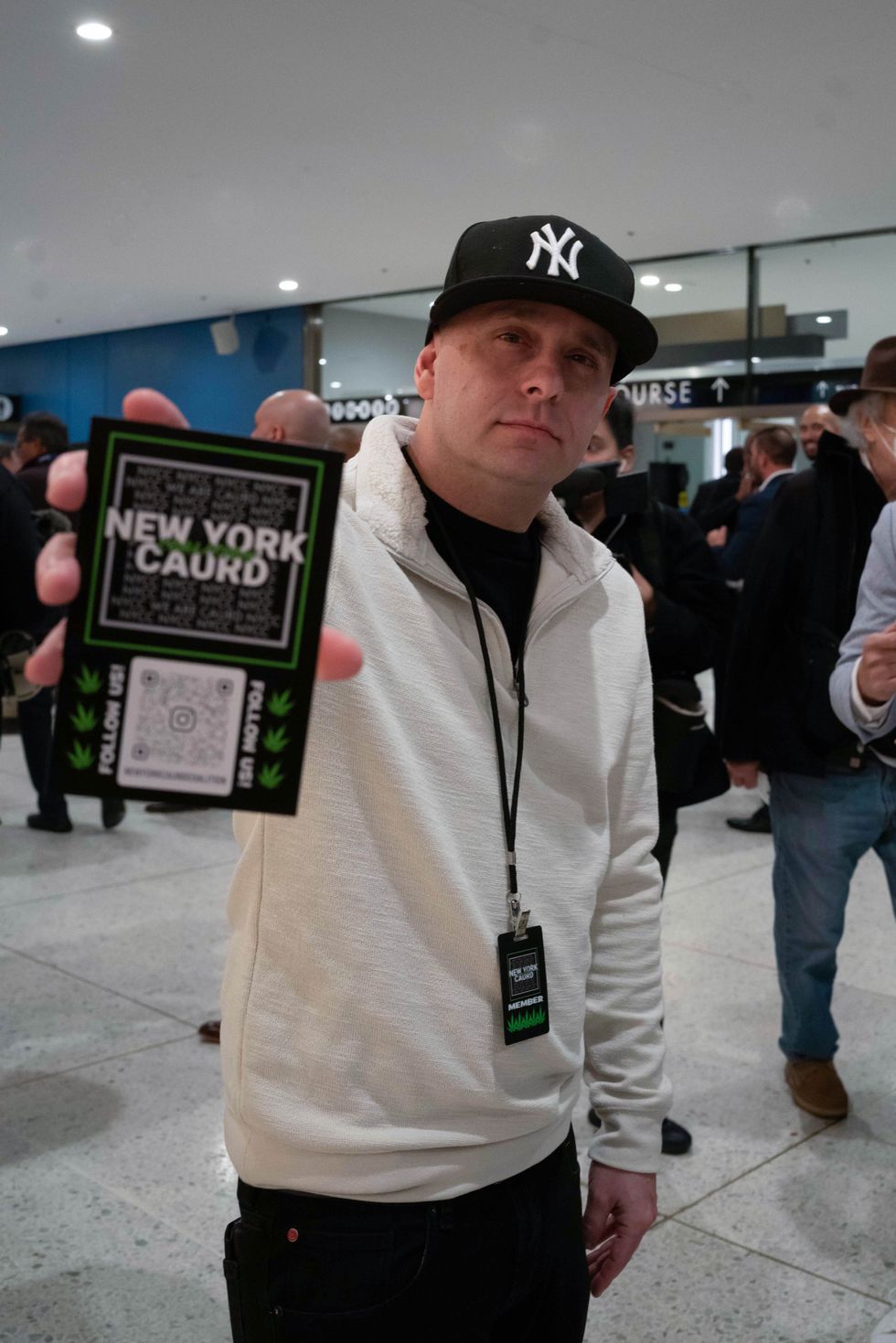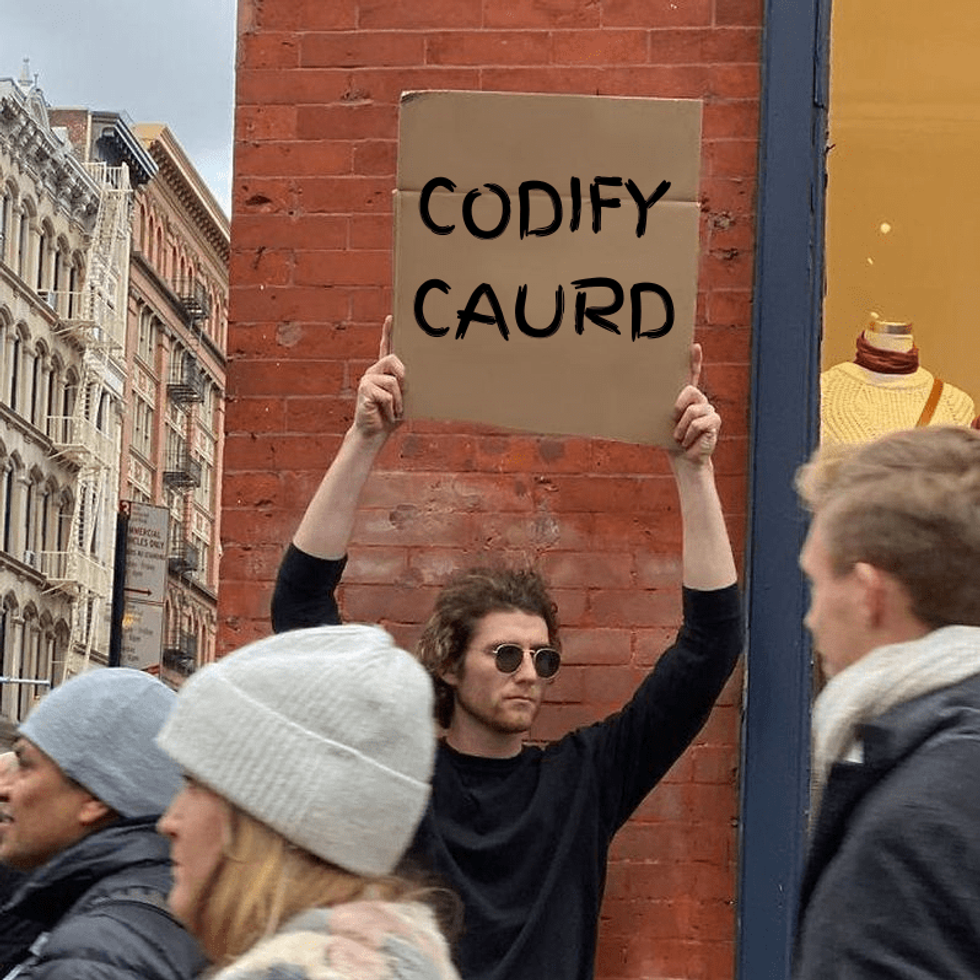New York's cannabis industry, once hailed as a beacon of hope for social equity and economic revitalization, is now teetering on the brink of a precipice. The dream of legal cannabis has turned into a nightmare for many of the industry’s entrepreneurs, as they grapple with a web of legal battles, injunctions, and the looming threat of large multi-state corporations entering the fray.
The Bluntness delves into the current state of New York's cannabis scene, exploring the promises and pitfalls of the Conditional Adult Use Dispensary (CAURD) program and the hurdles faced by those who dared to believe.
The CAURD Program: A Quasi-Reparation Scheme Gone Awry?
New York's CAURD program was envisioned as a quasi-reparation initiative, offering the first dispensary licenses to individuals (or family members) with prior marijuana convictions and/or from communities disproportionately affected by the war on drugs. The goal was clear: to provide opportunities for marginalized communities to benefit from the burgeoning legal cannabis industry and build "generational wealth." However, this road to success has been fraught with obstacles.
Entrepreneurs like Coss Marte, who had served prison time for marijuana-related offenses and has since been an exemplar of the business community via his fitness club brand ConBody, saw the CAURD program as an "unbelievable dream." He, along with hundreds of others, invested their savings, borrowed from family and friends, and put their personal finances on the line to secure licenses and properties for their cannabis businesses. For Marte and his partners, the investment amounted to nearly $1 million, a substantial sum by any measure.
Yet, despite their determination and commitment to the program, many CAURD license holders find themselves in a nightmarish limbo.
Initially it was an injunction issued in September 2022 by a state Supreme Court judge which finally got lifted in May 2023 giving many CAURD applicants and license holders some hope that things could FINALLY get going.
But just as they were starting to gain some traction after months of waiting, another injunction was issued by a state Supreme Court judge in relation to a lawsuit by a group of veterans, throwing their plans into disarray, leaving them once again unable to open their dispensaries as scheduled. For Marte, who is expecting a child, and building out his dispensary location, the uncertainty is a crushing blow.
“We’re disheartened but far from defeated,” seethed Marte. “I want these plaintiffs and MSO’s to hear me loud and clear. You may have powerful lawyers and lobbyists at your disposal to fund and fight this War on Drugs 2.0, but here’s what we have and that can’t be bought: unimaginable patience, resilience, and will to survive and succeed.”
“We know how to wait in line. People like us - who have been stopped and frisked our entire lives, who have served years for selling the same drug that is making you millions, who have experienced solitary confinement, and who have gone on to launch successful and profitable businesses in New York without capital loans. We are your worst nightmare, because nothing will stop us. Just like cannabis, we’re here for good,” Marte continued.
The Race Against Time: Losing the Edge
The CAURD program's initial promise of social equity and economic empowerment is now in jeopardy. While a few lucky license holders managed to set up shop in the initial months of NY’s legal cannabis rollout, the majority are unfortunately grappling with the very real prospect of financial ruin.
Now, the looming release of general licenses to a wider range of cannabis businesses, including large corporate players, has further dimmed their hopes.
It's a race against time for these entrepreneurs, who fear they might lose any competitive edge they gained by being early entrants to the market.
According to Marte, he thinks it’s time CAURD license holders put focus on educating consumers about who’s behind the big cannabis MSOs trying to decimate us and prevent the fulfillment of justice.
“Corporate weed only has power so long as consumers give them patronage. And fortunately for us, New York consumers care about social justice, community, and equity,” said Marte.
The Veterans' Lawsuit: A Legal Challenge to CAURD
The CAURD program faces a frustrating legal challenge from a group of disabled veterans who contend that it conflicted with the Marijuana Regulation and Taxation Act (MRTA), which legalized recreational marijuana in New York in 2021. The law had identified service-disabled veterans and women- and minority-owned businesses as groups deserving of prioritized social equity licenses.
These veterans, who had invested time and money in preparing to open dispensaries, including hiring lawyers and consultants, were left disheartened when they were informed that they did not qualify for a CAURD license.
Yet, if you look closely, several veterans were in fact among the initial licensees of the CAURD program, so this lawsuit is meritless and just an attempt to throw a huge wrench into the licensing process, which it certainly and unfortunately accomplished.
Several MSO’s have used this as an opportunity to throw gasoline on this dumpster fire by joining the lawsuit and demanding Gov. Kathy Hochul, step in.
However, their moment of reckoning may be imminent, as New York prepares to open the recreational market to a broader range of cannabis businesses, setting the stage for more potential competition.
According to Jim Anstey, founder of cannabis marketing consultancy BKLY, "in this post-meeting landscape, it's a blend of hope and apprehension. On one hand, there's optimism, fueled by the recognition that New York City boasts the largest market in the U.S., potentially even the world, and we stand at the dawn of a $2-3 billion market. However, this optimism is tempered by the stark reality that we're facing formidable interests willing to employ boundless legal resources to bend the industry to their will, even if it means crushing small-scale farmers and justice-involved retail entrepreneurs in the process.”
The Uncertain Future of CAURD Licensees
The fate of CAURD licensees hangs in the balance as the state's Cannabis Control Board deliberates on regulations for the broader recreational market.
It also remains unclear whether CAURD applicants who have not yet opened their dispensaries will have to reapply now in the face of mounting uncertainty.
CAURD applicants have initiated a petition to urge state lawmakers to codify the program into law, but neither Governor Kathy Hochul nor the Assembly or Senate majority leaders have responded to the idea. State Supreme Court Judge Kevin R. Bryant, who is presiding over the veterans' lawsuit, has indicated a willingness to consider exceptions to the injunction on a case-by-case basis, adding another layer of uncertainty to the mix. Yet, thus far he has not made any exceptions.
"Currently, it's a cycle of optimism intertwined with trepidation,” shared Joseph Calderone, COO and Chief Compliance Officer of women-owned Grateful Valley Farms and co-Founder of the Cannabis Farmers Alliance.
“While the Office of Cannabis Management's intentions seem commendable, the reality is that we're caught in a relentless struggle,” he continued. On one path, the ROs/MSOs seem to have the upper hand, getting everything they desire. Conversely, those with conditional licenses are grappling with a stagnant rollout, crushing taxes, financial losses, lawsuits, and burdensome regulations. These challenges hit us precisely when we should have been reaping profits to reinvest in our ventures. The silver lining is that OCM is engaging with AUCCs/CFA, and I hold a somewhat optimistic (perhaps mistakenly) belief that they'll amend these regulations as they understand the existential crisis we face.”
According to Jayson Tantalo, Co-Founder & COO of Flower City Dispensary, and Co-Founder & VP of Operations of New York CAURD Coalition, "Regulators' lack of support for vested stakeholders is disheartening. Their actions often seem empty, offering mere pacification without addressing our concerns. Despite hurdles, we hoped for respect and action from regulators. The disappointment remains, raising questions about their true intentions.
When donning his coalition hat, Tantalo shares his frustration with regulators. “Those directly affected must step out of their comfort zones and consider legal action to explore remedies. In unclear situations, we must assert ourselves, not passively rely on others. We were sold out without means to grasp onto. By taking proactive measures, we empower ourselves for justice and change," added Tantalo.

The Rise of Large Multi-State Corporations
While CAURD licensees contend with legal battles and the regulatory limbo, large multi-state operators (MSO’s) are eager to seize the reins of New York’s adult-use market.
The Cannabis Control Board's approval of regulations has paved the way for these corporations to enter the scene, potentially squeezing out smaller, socially equity-focused businesses.
The discontent among CAURD licensees and their supporters is palpable, with accusations of economic sabotage and concerns about the loss of social equity. The debate is intense, with some advocating for collaboration and solutions to enable smaller businesses to compete, while others resent the influx of large, out-of-state corporations.
“If the state really believes in the equity initiatives they are trying to do, they need to do it more carefully,” shared everyone’s favorite cannabis lawyer, Jeffrey Hoffman. “Therefore without codification of CAURD into law, the industry remains ensnared in uncertainty, potentially leading to more disputes, lawsuits, and continued impediments to the industry's growth, rollout, and social equity objectives."

Meaning the OCM needs to be more thoughtful in creating and releasing regs and processes so as to avoid susceptibility to lawsuit after lawsuit and hamstring applicants and licensees.
The Precarious State of New York Cannabis Rolls On
New York's cannabis industry is at a crossroads, facing a race to the bottom that threatens the very principles it was built upon. The CAURD program, designed to empower marginalized communities and provide reparations for the War on Drugs, now stands at a critical juncture.
Entrepreneurs, like Coss Marte, Jayson Tantalo and Jeremy Rivera among many others, who invested their hopes, dreams, and savings find themselves in a legal quagmire, with the specter of corporate giants looming large.
Will they manage to overcome the hurdles and realize their dreams of cannabis entrepreneurship, or will they be left by the wayside as lawsuit after lawsuit brings the industry to a halt while large corporations come in and dominate the landscape, marginalizing these people once more?
Only time will tell, but one thing is clear: New York's cannabis industry is in a precarious state, with the race to the bottom becoming all too real for those who dared to believe in its promise of social equity and economic empowerment.
The one redeeming quality that no judge or MSO can diminish is the fact that us New Yorkers are renowned for our unparalleled toughness and resilience (and bluntness!!!!).
Time and again, we have demonstrated an unwavering spirit to persevere through the most formidable challenges. From the aftermath of 9/11 to the recent global pandemic, New Yorkers have faced adversity head-on, displaying a unique brand of strength and unity that sets us apart.
Once again, it will be our ability to come together, support one another, and rebuild in the face of adversity that will showcase the indomitable spirit that defines the real New York cannabis industry - legal or otherwise.

















 How to Become a Budtender: Complete Career Guide & Salary Information - The Bluntness Photo by
How to Become a Budtender: Complete Career Guide & Salary Information - The Bluntness Photo by  How to Become a Budtender: Complete Career Guide & Salary Information - The Bluntness Photo by
How to Become a Budtender: Complete Career Guide & Salary Information - The Bluntness Photo by